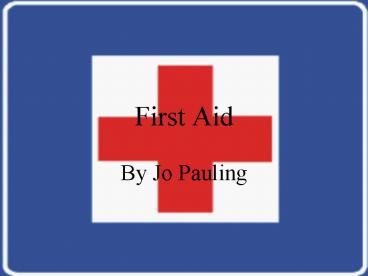First Aid - PowerPoint PPT Presentation
1 / 11
Title:
First Aid
Description:
First aid is the first treatment given to a person for any injury, before the ... Information taken from: Applied science GCSE Double Award. Editor: Stewart Ghenery ... – PowerPoint PPT presentation
Number of Views:682
Avg rating:3.0/5.0
Title: First Aid
1
First Aid
- By Jo Pauling
2
What is first aid?
- First aid is the first treatment given to a
person for any injury, before the arrival of a
qualified expert. In giving this treatment your
responsibility is to help recovery and prevent
the condition from becoming more serious. You may
be the first at the scene of the accident,
3
Common injuries in the lab!
- Heat burns and scalds
- Chemical burns
- Injury from breathing in fumes or swallowing
chemicals - Electric shock
- Cuts and damage to the eyes from particles or
chemicals
4
Heat burns and scalds!
- Flood the injured part with cold water for 10
minutes to stop the burning and relieve the pain. - Gently remove any jewellery, watches, belts, or
constricting clothing from the injured area
before it begins to swell. - cover the area with a sterile dressing, or any
clean, non-fluffy material, and bandage loosely
in place.
5
Chemical burns!
- First make sure that the area is safe. Ventilate
the area and, if possible, seal the chemical
container. Remove the casualty from the area if
necessary. - Flood the affected area with water to disperse
the chemical and to stop the burning. Do this for
at least 20 minutes. - Gently remove any contaminated clothing while
flooding the injury. - Take or send the casualty to hospital watch
their airway and breathing closely. Note and pass
on any details about the chemical to medical
personnel.
6
Injury from breathing in fumes or swallowing
chemicals!
- Anyone suffering from the effects of gas or toxic
fumes needs air, therefore the area should be
well ventilated and medical assistance requested. - In cases where chemicals have been swallowed, it
is important that the substance is identified if
possible and medical help requested. You should
never give anything by mouth unless specifically
instructed to do so by a medical officer in
authority.
7
Electric shock!
- Make sure the person is no longer in contact
with the source of electric and that the electric
mains it turned off before treating. - If it burns the skin, treat as already described.
If unconscious or suffering from shock, in all
such cases further medical help should be sought.
8
Cuts and damage to the eyes from particles or
chemicals!
- If an object is embedded into the eye, you should
not remove the object. - Cover both eyes with sterile dressings to
immobilize them. - DO NOT rub or apply pressure or ice to the eye
unless its a black eye, but do not place
directly on the eye.
9
Why its useful to have a first aid qualification!
- It is important that everyone has some idea about
first aid, because if an accident happens, the
people near by need to know what to do. - In school there are trained first-eiders, just in
case an accident should happen, however, if your
at home you may be put into a situation where you
have to treat an injured person. - You should never do first aid if you are not sure
what your doing.
10
Where you can get training and how!
- Three voluntary organisations all run first aid
courses. Here are the names and address for them
St John Ambulance National headquarters 27 St
Johns Lane London EC1M 4BU
The British red cross society 9 Grosvenor
crescent London SW1X FEF
St Andrews Ambulance Association St Andrews
House Milton Street Glasgow G40HR
11
Information taken from
- Applied science GCSE Double Award. Editor
Stewart Ghenery - First aid manual, Dorling Kindersley. ISBN
0-7513-0707-6































